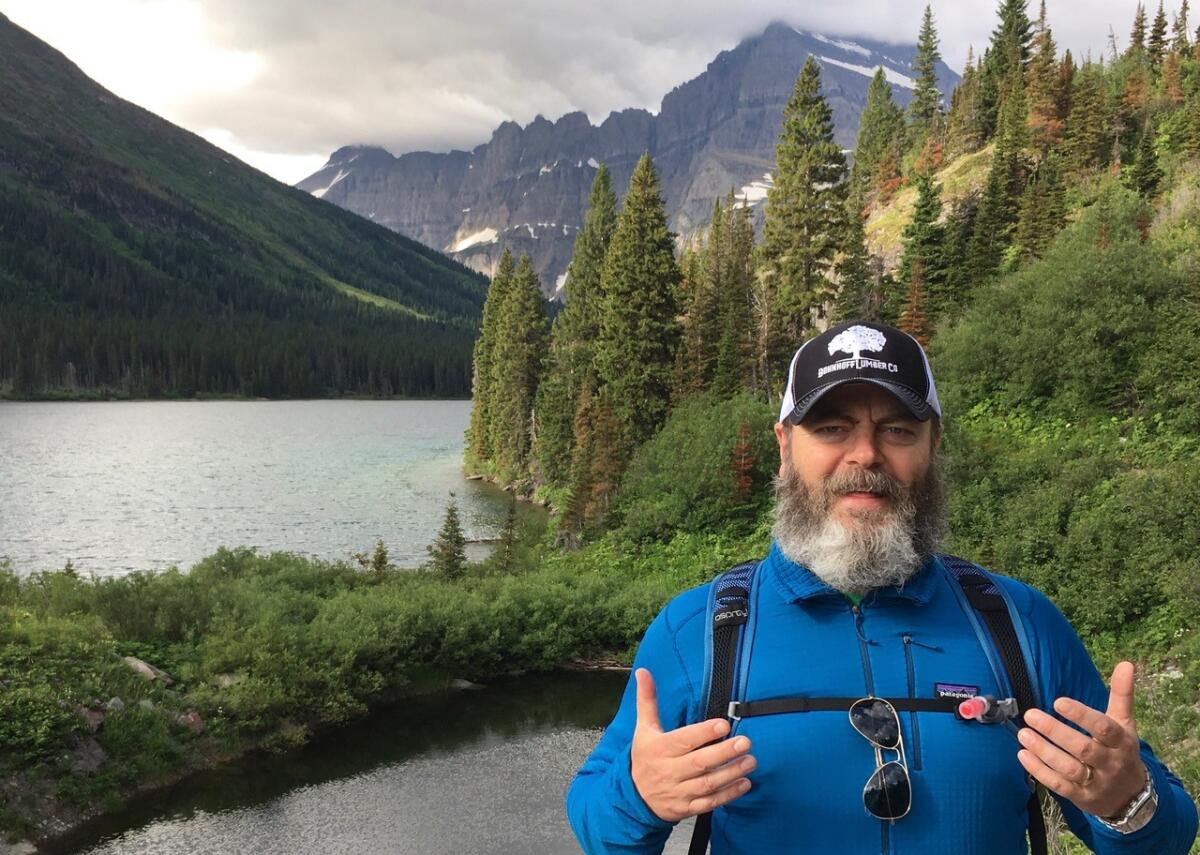Column: Meet the comedians telling hilarious jokes about climate change

- Share via
Lots of people enjoy laughing at billionaires — but it wasn’t just any billionaires who were the targets of Esteban Gast’s comedic jabs last week at the Crow, an intimate comedy club just off Metro’s E Line tracks in Santa Monica.
After admitting that a few years ago he vacationed at an all-inclusive resort (“still the same old me ... I’m on your level,” he joked, stepping down from the stage), Gast marveled at the executives for whom unlimited margaritas weren’t enough.
“They would be there and be like, ‘Can I buy the plates?’” he riffed. “Like, they would find something that they’d be like — ‘How much for the resort?’ You know what I mean? They’d be like, ‘How much for that server?’ And you’re like, ‘That’s a man.’”
It was strong material. And then Gast brought it back to the evening’s theme: the climate crisis.
“Darren Woods, the CEO of Exxon, has unlimited margaritas, and he wants more?” Gast asked.
You're reading Boiling Point
Sammy Roth gets you up to speed on climate change, energy and the environment. Sign up to get it in your inbox twice a week.
You may occasionally receive promotional content from the Los Angeles Times.
Gast commended activists who shame fossil fuel executives. He also suggested that “we’ve got to good cop-bad cop them.”
“If I see Darren Woods, I just want to be like, ‘Hey man, I want you to know you’re enough,’” he said, to the delight of the 30 or so people in the audience, who roared with laughter. “‘I want you to know, you don’t have to prove anything to anybody.’”
Gast added, “Maybe that works. Maybe he’s like one long hug away from being like, ‘What am I doing?’”
When I’ve told friends and family over the last few weeks that I was planning to write about “climate comedy,” their reaction was usually some variation of, “That sounds weird. Isn’t climate change depressing?” The short answer is yes, climate change isn’t the happiest topic. Deadly heat waves, devastating fires, destructive storms — pick your poison. The outlook is grim.
Which is why we need comedy: to help us cope, and to remind us there are viable solutions at our fingertips. Solar panels, wind turbines, electric cars, heat pumps, induction stoves — we’ve got most of the tools we need to stop burning fossil fuels.
So I’ve been delighted to discover there’s a growing cadre of comics learning to talk climate — and taking their acts across the country. Gast is on the vanguard of this movement. He’s comedian-in-residence at clean energy advocacy group Generation180, where he helps get other comedians up to speed through a fellowship program called the Climate Comedy Cohort.
“Think about it as a comedy writers room, but half of the writers are comedians and half the writers are climate change experts, and they are providing each other information,” said Caty Borum, executive director of the Center for Media and Social Impact at American University’s School of Communication, which helps run the cohort.
There’s a long history of comedians using jokes to raise awareness of serious subject matter. Few people are better versed in that history than Borum. After working as a philanthropy director and producer for Hollywood legend Norman Lear early in her career, she conducted extensive research into comedy’s power to prompt social change, ultimately writing two books.

One takeaway: Humor can serve as translation, taking technical information that’s meaningless to many people — like 2 degrees Celsius — and providing an “entryway” through jokes, Borum said. If people laugh now, they may want to learn more later.
“We as humans are emotional creatures. Part of how we are persuaded is being amused,” Borum said.
Generation180 put that principle to work in its Climate Translator videos, pairing comic David Perdue with a guy in a lab coat (not actually a scientist) to explain the economic benefits of climate-friendly electric heat pumps, among other topics.
Another takeaway from Borum’s research: Comedy tends to be more memorable than other types of storytelling.
“Marketing people have known this forever. This is why Super Bowl ads are so funny,” she told me.
I certainly won’t forget last week’s show at the Crow — especially Gast, but also Brad Einstein’s high-energy set.
He started out by telling us he was once a “perpetrator of climate misinformation,” when he was paid to write tweets for “one of the largest oil conglomerates on the planet.” Alas, he said, a nondisclosure agreement meant he couldn’t say which company.
“That really sucks,” he said. “It’s worse than when you’re just done with a breakup, and then you get a call on your cellphone in the middle of the night, and they just want to get closure. Because there’s nothing worse than dealing with an ex-on-mobile.”
I thought about it, then groaned, then laughed. I was far from the only one.
“I was the voice of ExxonMobil,” Einstein confirmed. “The [nondisclosure agreement] is long since done.”
Einstein went on to belittle Exxon for what he sees as rampant greenwashing — the corporate practice of trying to persuade the public that a company is good for the environment and public health when in reality its actions are overwhelmingly harmful.
He hit Exxon especially hard for its “women in STEM” public relations materials, roasting the oil company for promoting the noble cause of employing more women in science, technology, engineering and mathematics while simultaneously selling products that are cooking the planet, polluting the air and introducing microplastics to our bodies. He closed with a rousing song on guitar.
I can’t replicate the song’s hilarity in this column, but suffice to say, here’s part of the chorus: “Because they’re women in STEM — STEM! If you hate them, then you hate women, especially women in STEM — STEM! No criticism — it’s only women in STEM... And we promise that we’re honest, you can take us at our word. Just please pay no attention to this dead oil-soaked bird ...”

Exxon, by the way, isn’t amused. Spokesperson Emily Mir told me via email that there’s “nothing funny about climate change.”
“That’s why we’re focused on implementing real solutions for a net zero future by pursuing more than $20 billion in lower-emission investments from 2022 through 2027,” she told me — without mentioning that the company is spending far more on expanding oil and gas production, while also suing shareholders who dared to urge the company to work harder on climate.
To be fair to Exxon, not every comedian at the Crow had me guffawing. But there were plenty of laughs.
Across town, meanwhile, another climate comedy event was happening at roughly the same time.
As part of the Netflix Is a Joke festival, the actor Nick Offerman (aka Ron Swanson from “Parks and Recreation”) hosted a show at the Wilshire Ebell Theatre to raise money for the Natural Resources Defense Council, an advocacy group. The comics — including Steve Agee, Nicole Byer and Kumail Nanjiani — mostly didn’t tell climate jokes. But they wanted to support the cause.
The week before the event, I asked Offerman how he’d decided to fundraise for NRDC.
“I am not a brilliant scientist, or really a brilliant anything, except maybe a shoveler. I am super good at shoveling, and luggage. I’m very good at carrying luggage. I can do 13 pieces, even through the Atlanta airport,” he said. “But since I am not a scientist, I basically use what platform I have to be a cheerleader to the best of my abilities for people doing this good work.”
And how had confronting the climate crisis become near and dear to Offerman’s heart?
He told me about his connection with soil — being raised in a small town by parents who grew up on farms, and reading Wendell Berry and Michael Pollan, and starring in a cutesy ad called “Face Plant,” part of an NRDC campaign to persuade Congress to offer growers financial incentives for planting cover crops, which can suck heat-trapping carbon dioxide out of the atmosphere.
He described how he came to realize that many of Earth’s environmental and health problems stem from coal, oil and gas.
“My gateway topic is agriculture, but I find all of these topics inseparable,” he said. “The way that we’re farming industrially fills our watersheds with poisons. That’s all driven by fossil fuels. The way that we industrially produce meat and eggs and dairy, and harvest ocean life. The root of it is all is fossil fuels, whether we’re making blue jeans in Southeast Asia or soybeans in Iowa.”
Offerman is right. And he sees humor as an ideal tool for spreading the word.
“I basically try to serve the pizza of comedy and sneak as much of the broccoli of agrarianism into that pizza,” he said.

That’s what I enjoyed most about Gast’s billionaires riff, and some of the other climate humor I’ve heard recently.
Rather than putting global warming front and center, these comedians are telling jokes about universal topics and then layering in climate and clean energy, once audiences are already laughing. It’s a similar strategy to the one recommended by writers and producers encouraging Hollywood studios to make more movies and TV shows that reflect the reality of climate change.
Gast and the Climate Comedy Cohort have also prioritized talking about the Inflation Reduction Act, the $369-billion climate and clean energy law signed by President Biden — a valuable decision ahead of the November election, with polls showing that even climate-conscious young voters don’t give Biden much credit for the landmark legislation, if they know about it at all.
During his set last week, Gast briefly touted the law’s benefits before poking fun at its bizarre name.
“Clean Air Act, Clean Water Act — the next one is Inflation Reduction Act. And you’re like, ‘I love how priorities have shifted,’” Gast said. “They were trying to sell it, and they’re like, ‘Should we save the Earth?’ And people were like, ‘Eh, too partisan.’”
But when the pitch was, “Should eggs cost less?” In that case, “Pass it!”
Depressing or optimistic? Maybe both. The bill didn’t win any Republican votes, but it did get through Congress.
Beyond Gast and his colleagues, other comedians are having fun with the Inflation Reduction Act.
Take Yellow Dot Studios, a media nonprofit founded by director Adam McKay. In sharp contrast to the hopelessness espoused by McKay’s climate metaphor film “Don’t Look Up” — in which a bumbling U.S. president played by Meryl Streep denies the obvious scientific reality that Earth is about to be destroyed by a comet — Yellow Dot has produced comedy videos highlighting the clean energy tax incentives in Biden’s climate law. McKay’s studio has also worked with the Climate Comedy Cohort.
“We want people to be enjoying themselves and laughing,” said Staci Roberts-Steele, Yellow Dot’s managing director.
My former editor told me not to use cliches. But she retired, so here goes: Laughter is the best medicine. Or for climate, at least, it’s a lot more useful than despair. How can we wrangle this existential threat if we believe we’re doomed no matter what?
I was perusing the website formerly known as Twitter this week when I happened upon a decade-old clip from Aaron Sorkin’s TV drama “The Newsroom,” in which a climate scientist played by Paul Lieberstein (better known as Toby Flenderson, Michael Scott’s foil on “The Office”) is interviewed by news anchor Will McAvoy (Jeff Daniels). Lieberstein offers his prognosis for humanity: “Your house is burning to the ground, the situation is dire. Your house has already burned to the ground, the situation’s over.”
In other words, he says, “You’re already dead.”

McAvoy is incredulous. There must be something we can do, right?
“There’s a lot we could do, if it were 20 years ago or even 10 years ago. But now — no,” Lieberstein tells him.
Watching the clip today, my feelings toward Lieberstein’s scientist are similar to how Michael Scott must have felt about Toby.
Sure, it’s kind of funny — in the same way that watching President Streep let Earth get decimated by a comet in “Don’t Look Up” was disturbingly amusing. It doesn’t make me want to fight to save humanity. It makes me want to tear my hair out.
It’s also not based in reality.
As scientists keep saying — and as I hope the Aaron Sorkins of the world are able to internalize — dealing with the climate crisis isn’t as simple as living or dying. A lot of people are already dead, and many more will die. But there are plenty of lives we can still save. Every wildfire that’s a little less severe, every storm that’s a little less ferocious, every heat wave that’s a little less hot — it all matters. Every tenth of a degree counts. Even if we don’t limit global warming to 2 degrees Celsius, 2.1 is way better than 2.2.
Gast gets it. One of the greatest lies ever told, he said at the Crow, is that there’s no hope.
“People are like, ‘We’re all gonna die,’” he said, sounding exasperated. “And you’re like, ‘Yeah, to be human is to be mortal. Were you immortal before the ice caps started melting?’ What do you mean we’re gonna die?”
Laughter is the best medicine — and the best jokes are true.
So let’s keep making each other laugh, and fighting the good fight, and asking oil executives if they’d like some hugs.
This column is the latest edition of Boiling Point, an email newsletter about climate change and the environment in California and the American West. You can sign up for Boiling Point here. And for more climate and environment news, follow @Sammy_Roth on X.
Toward a more sustainable California
Get Boiling Point, our newsletter exploring climate change, energy and the environment, and become part of the conversation — and the solution.
You may occasionally receive promotional content from the Los Angeles Times.




